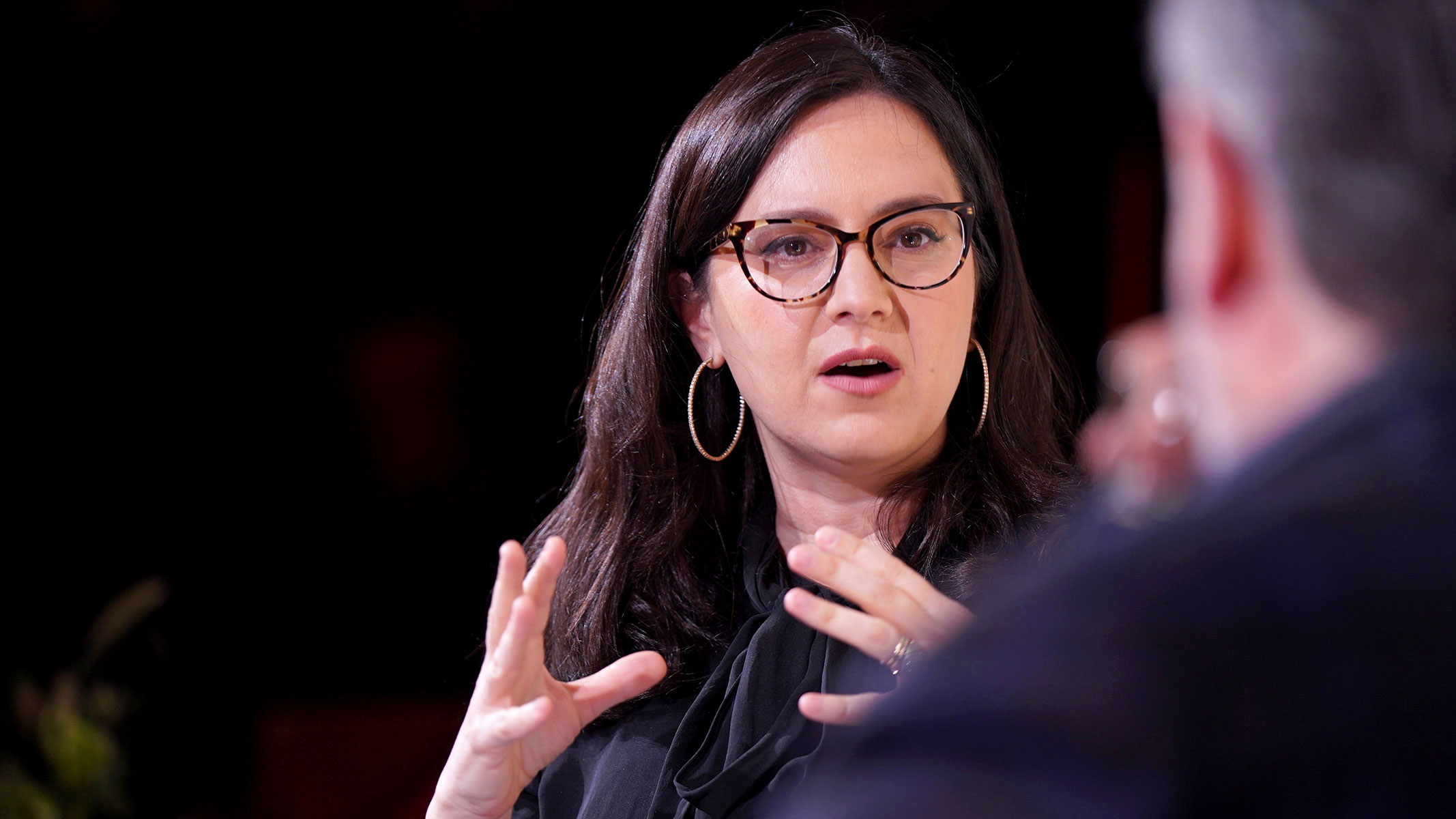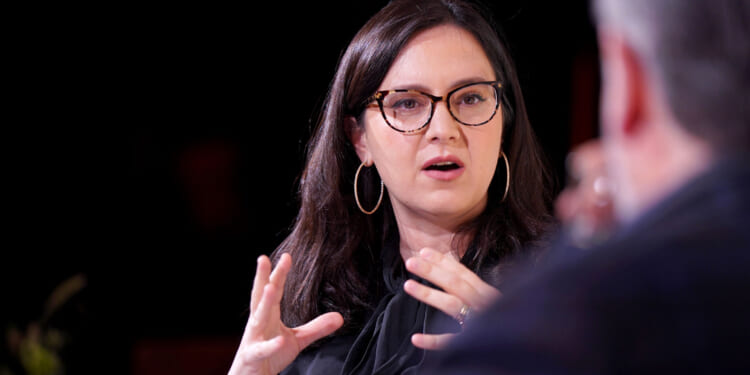
What does it mean for American media when someone like Bari Weiss is tapped to lead one of the country’s legacy news outlets? Rafael Mangual, Jesse Arm, Carolyn Gorman, and Kerry Soropoulos analyze Paramount’s acquisition of The Free Press and the appointment of Weiss as editor-in-chief of CBS News. The panel explores Weiss’s track record of challenging orthodoxies and what her rise signals for journalism’s future. They also discuss California’s shifting political dynamics, spotlighting Representative Katie Porter’s potential gubernatorial run.
Finally, a reason to check your email.
Sign up for our free newsletter today.
Audio Transcript
Rafael Mangual: Hello and welcome to another episode of the City Journal Podcast. My name is Rafael Mangual. I’ll be your host for today and I am so happy to be joined by my awesome colleagues. We’ve got Carolyn Gorman, Jesse Arm, and the wonderful Kerry Soropoulos. What’s going on everybody? Thanks for joining us.
Carolyn D. Gorman: Hey Ralph.
Rafael Mangual: How you guys doing? Good week so far? Fun?
Carolyn D. Gorman: Halfway. Halfway through.
Rafael Mangual: So I suppose on this show we’re supposed to talk about news and relevant stuff. And I can’t stop thinking about all the reactions to Bari Weiss and The Free Press being bought up by Paramount and Bari Weiss being named the new editor in chief of CBS News. Seems like good news. I like The Free Press. I like Bari. I think it’s great. But a lot of people seem to be pretty pissed or at least very jealous. And they’re not doing a good job of hiding it.
Carolyn D. Gorman: Very jealous seems to be the key here, Ralph.
Rafael Mangual: Yeah. Did you guys see Jessica Testa’s piece in the New York Times? I mean, just absolutely dripping with snark. And she put it up in an X post and turned off her replies, which I thought was kind of hilarious. I just want to know, are you guys following this? What’s your reaction?
Carolyn D. Gorman: Look, Bari Weiss is a disrupter in a good way and she’s the exact, she’s exactly the type of person that you want to see have success because she has clarity of thought and clarity of morale and clearly wasn’t being listened to at the New York Times and it’s not surprising at all that, you know, someone at the New York Times was being really salty about it and not willing to engage in the conversation.
Rafael Mangual: Yeah, no, I mean, and I think it’s just important to take a step back to and just what Bari Weiss did with The Free Press, I mean, that was originally a Substack called Common Sense. Turn, it was like three people and then turn that into a media empire. I mean, over a million. Yeah. Yeah.
Jesse Arm: You have to talk about the time horizon in which she did all this too. I mean, it was 2020, just five years ago when she was essentially ousted from the New York Times for being a dissident to what the cultural consensus of summer 2020 was among elites, the places who ran places like the New York Times. And she went off completely on her own and basically said, I’m, well, the full recapping of the story has to do with commissioning a piece from Senator Tom Cotton about the use of the National Guard, ironically.
Rafael Mangual: Yeah, which I was involved in in a weird way. I had a piece that was commissioned by the same editor who commissioned the Cotton piece at the time. It was on police reform.
Jesse Arm: So that’s our friend, Adam Rubenstein, friend of the pod, right? Who’s going to be, I think, now taking a pretty senior role as well within The Free Press.
Rafael Mangual: That’s right, which I could not be happier about because I think his instincts are just absolutely phenomenal. But yeah, no, at that time I had a… No, but I just…
Kerry Soropoulos: Well, you wouldn’t. Are you getting a cut of this, Ralph?
Jesse Arm: If anything, no, these are, know, in some sense, if you’re thinking about it relative to City Journal competitors, I guess, but it’s only something laudable. And I think it’s really just proof that the excesses of that moment, summer 2020, when craziness was kind of at a peak among elite, white, wealthy people who kind of subscribed to the New York Times, this is proof that like, the excesses of that moment are now being rolled back and that’s definitely something to celebrate. And not all the negative attention being paid to this is coming from the left as well. And those people dripping with jealousy. There is a population within the right that I think views Bari Weiss as someone who is unwilling to bend the knee completely or totally or doesn’t have a social or cultural agenda that perfectly harmonizes with some people in our broader orbit, maybe her views on abortion or immigration or gay marriage or whatever.
Rafael Mangual: In other words, an independent thinker, i.e. someone who you want to be running a news organization, right? Like, yeah.
Jesse Arm: And someone who’s heterodox, and someone who’s heterodox, doesn’t fit into boxes. And I can’t tell you how many, mean, what is Bari Weiss, right? She’s firmly pro-Israel, she’s kind of firmly anti-woke, but she’s had people on her platform and given them a voice in the pages of her outlet to express the counter perspective even on those notes.
Kerry Soropoulos: That they would never get, a platform that they would never get at old CBS or at the old Times. I think it’s also important to note that when she left the Times, it wasn’t because she was forced out by the top, she was forced out by the bottom. She was forced out by the kind of, it was the dictatorship of the commentariat, the lower-level staffers and interns talking trash about her in the Slack channel and not by senior editorialship, but it was their kind of spinelessness that spurred her to leave and make an institution that was free, free press, but free from that kind of influence from the bottom. And so it’s the greatest revenge of success. And now she’s done it, but it’s, you know, it’s, it’s a little bit high school, the New York Times kind of catty reaction to this. It’s very high school.
Rafael Mangual: A ton high school. And I think that is kind of just a perfect illustration of what the problem with the media elite is, the establishment media is, which is that it has treated itself and regarded itself as this exclusive private club. They get to be the mean girls who decides who comes in and who goes out. And when you have someone like Bari Weiss, who’s clearly brilliant, who clearly at the time was the best writer on staff, who doesn’t align perfectly, there’s this sense that it’s threatening. That’s the stuff that I think everyone saw through. It’s why I think the Times and other legacy media institutions have suffered reputationally. And it’s why I think The Free Press succeeded to the extent that it did.
Carolyn D. Gorman: Yeah, I think that’s right. Look, there’s something to be said about the work. Yeah, I was cutting you off, Kerry.
Rafael Mangual: Wait, Terry was doing his Trump finger for…
Kerry Soropoulos: I’ll tell you who Bari Weiss is. Bari Weiss is the girl who goes away for a couple years. She’s in middle school. She goes away at the beginning of high school. Then she comes back to prom and she’s crowned prom queen. And then all the girls who excluded her trying to dump a bucket of pig’s blood on her head.
Rafael Mangual: That’s right.
Carolyn D. Gorman: The 90s rom-com queen, yeah.
Kerry Soropoulos: Yeah, she’s a 90s rom-com queen. You heard it here first.
Carolyn D. Gorman: But look, I think every workplace can have its issues. Like, the New York Times is not the only institution that kind of has a little bit of attitude. That isn’t always necessarily the problem. I think it’s the herd mentality that’s really the problem. And it does seem really interesting and promising that, you know, this is coming from the top, this promotion, if you would call it that, you know?
Jesse Arm: I have two personal Bari Weiss anecdotes to offer as we go through this conversation. One was just a couple of weeks ago. For context for viewers or listeners who don’t tune in all that often, my role within the Manhattan Institute is to help lead our kind of government relations efforts and outreach work here in Washington, DC. And I recently was at a happy hour event with a number of senior folks within the administration and some people who work on Capitol Hill and some lobbyist types. I, someone asked me where I work and I said the Manhattan Institute. And they said, oh yeah, Bari Weiss. And I was like, yep, yeah, yeah, yeah. Not actually, but I didn’t want to take credit. And I thought, you know, just kind of an association by proxy there was pretty exciting.
Rafael Mangual: Normally if I get asked where I work at a happy hour and I say the Manhattan Institute, the next thing I do is put my hands up and just get ready and be able to start swinging.
Jesse Arm: Yeah, that felt like a fairly safe space. Like, you know, the fact that like, I guess enough of our fellows are writing Douglas Murray, Abigail Shrier, you’ve been in The Free Press, Ralph, a number of other members of our team are in the pages of The Free Press frequently enough that I guess there’s some common overlap there.
Rafael Mangual: I’ll take it.
Jesse Arm: That’s, you know, that I welcome that, you know, association. And then the other personal anecdote I have about Bari Weiss comes from when I was an undergrad and the first time I was ever published in a major news outlet, we had one of these classic kind of, you know, late Obama era crazy peak woke instances at my campus at the University of Michigan where we invited the AEI scholar Charles Murray to come and give a talk about populism.
Kerry Soropoulos: Former MI scholar too, Jesse. Don’t sell us short.
Rafael Mangual: Former MI scholar, yeah.
Jesse Arm: Sure, yeah, absolutely. But yeah, mean, he’s kind of, you know, he’s a little something year old, kind of at the time, like never-Trumper sort of libertarian-adjacent social scientist. And yeah, I invited him to give him a talk on his latest book called Coming Apart, which was about, you know, the kind of unraveling in the country and how a populist figure might step into the void left by unaddressed concerns with white working class populist voters and flyover country. Yeah.
Carolyn D. Gorman: Someone just like Kerry.
Rafael Mangual: A book he wrote as an MI Scholar.
Jesse Arm: And then Trump got elected. So, we thought relevant to bring, you know, give this guy an opportunity to talk and anybody could come and ask him questions about it. In my naivete, I, know, free speech evangelists that I was, we invited everybody on campus to attend who wanted to. And it was like full blown aggressive employment of the heckler’s veto. We got these threatening messages ahead of time, from something called the Campus Antifascist Network, which I learned later was Antifa, which I wasn’t familiar with at that point. And it was just crazy. They were like throwing stuff. They were commandeering the microphone from him, playing Darth Vader music and turning off the lights and setting off alarms and putting projections on the screen when he was trying to speak. But I was just so angry when I was like sitting at the dinner afterwards with the scholar who we had invited. And I went back to my college apartment and wrote up some emotional, poorly written screed about what had happened and sent it a few places and Bari Weiss from the New York Times took a look at it and helped me turn my slop that I probably wrote as a college senior like with a thesaurus, you know, just try to use as big a word as I possibly can into like a good piece and she published me and I’m eternally grateful for that.
Rafael Mangual: That’s amazing. I didn’t know you were in the Times. That’s awesome. I had to wait till I was like in my 30s to get into the Times for the first time.
Jesse Arm: Well, I haven’t been back since, so you know.
Rafael Mangual: I’ve only been back once since. I’ve only managed to get two pieces past the goalie there. Although one of them would have gotten past the goalie and that was the piece that Adam Rubinstein had commissioned. But after all the fallout with the Tom Cotton thing, the Times just ghosted me on the piece, so I ended up pulling it and publishing it in the Wall Street Journal.
Jesse Arm: Well, you know what, better to have pieces in The Free Press than the New York Times anyway.
Rafael Mangual: Yeah, yeah. No, I love writing for The Free Press. I mean, my favorite thing that I’ve done with The Free Press, which they, I think, do really well is I’ve participated in a couple of Free Press debates on the Honestly Pod. And those have been great. I did one with Lara Bazelon, who’s like a criminal justice lefty person out in San Francisco, who actually I personally like. think I’ve enjoyed my exchanges with her. We’ve had a few different debates, but we did a debate on Honestly and then we did a written debate for The Free Press, which I thought was like, this is exactly the right way to approach things, right? It’s like, all right, here’s a controversial issue. We’re right smack dab in the middle of this BLM stuff. And you have two people who couldn’t disagree more about almost everything in the space, but we’re going to bring them together. We’re going to allow them to have an exchange. And then to the extent that there was any lack of clarity during the pod where we were talking over each other, we’re going to make sure people get an opportunity to see which side believes what by having this kind of dueling essays thing. And I thought that was fantastic.
Carolyn D. Gorman: And this seems like the type of thing that people really have an appetite for right now. I mean, really, you just start, it does feel like something has changed and people are starting to feel like I want to be out of this herd mentality. Like, what are the points of this debate? What, what should I know about this? What should I question about this? And being, having more opportunities to facilitate that is, is great because I think there is a real kind of thirst for it right now.
Rafael Mangual: Yeah. No, think that’s right. I think people have kind of gotten to a point where they assume if they’re reading something in the media that it is, you know, one-sided and slanted and reflects only the opinions of whoever’s driving that particular institution. And the only way to undermine that assumption is to, you know, make sure that you’re giving the other side its due. And Bari Weiss has kind of mastered that. Yeah.
Carolyn D. Gorman: Can I say something about that, Ralph? I’m not sure it’s that important for institutions to change the way that they sort of overall frame the debate, but it is really important to engage. You know that the Wall Street Journal is going to be a little bit on the right. You know that the New York Times is going to be a little or a lot on the left. But being able to have a conversation and receive comments on your X post or whatever, having a willingness to have respectful conversation I think is most important.
Jesse Arm: The news side of the Wall Street Journal probably not. The opinion…
Carolyn D. Gorman:
Rafael Mangual: Yeah, I think that’s right. Jesse, what were you just saying?
Jesse Arm: Wall Street Journal opinion side maybe a little on the right. News side, different story.
Rafael Mangual: Yes. Yeah, I was going to say that too. Absolutely. The opinion side for sure. News side, not so much. But sort of speaking of the debate thing, I mean, one of the things that The Free Press just did and is making use is they hosted a debate between Coleman Hughes and Dave Smith on Israel, which I was really kind of looking forward to.
So for those of you who don’t know, Dave Smith has kind of been making the rounds around the country, debating people, pushing this idea that Israel is, you know, basically engaged in this long-term psy-op to get the U.S. to do its bidding in the Middle East.
Kerry Soropoulos: And what’s his expertise, Ralph? Remind me, is he a scholar or is he… okay.
Rafael Mangual: He’s a comedian. He’s comedian. He’s just a comedian, guys. It’s just his opinion. He’s just a comedian. He’s not an expert. Doesn’t need to be an expert to have an opinion, by the way. All true, but it is like this weird kind of shtick he does. But I actually was not expecting it to go as well as it did. I thought for the most part they were incredibly respectful of each other. They weren’t talking over each other. It wasn’t a screaming match. It didn’t devolve into ad hominem. And it allowed listeners to just watch arguments get, you know, picked apart in my opinion. thought Dave Smith came out of that bleeding from both ends there. But I wonder what you guys made of it if you caught it.
Carolyn D. Gorman: You don’t need to be an expert to weigh in on something, but you have to be willing to be picked apart, I think, if you’re going to.
Rafael Mangual: Yeah, well, there’s, you don’t have to be an expert, right? I mean, I think that’s right. Everyone’s entitled to have an opinion. But what I don’t like is this idea that no one that you can’t be held accountable for the things that you say, as long as you drop this disclaimer somewhere along the line, this long, you know, screed or conspiracy theory that you’ve woven together based on your non-expert opinion or whatever. That’s the thing that I think, you know, kind of comes off as duplicitous. But, but Kerry, did you get a chance to see it?
Kerry Soropoulos: I did, enjoyed it. I thought, Coleman Hughes is very level-headed and usually you don’t see Dave Smith kind of get off his rocker that much, but he was definitely off his feet with Hughes being able to pick him apart and just having the facts with him. Dave Smith loves to bring up this memo, supposedly, that Wesley Clark, a former general, supposedly saw in the Bush administration saying we were going to take out…
Rafael Mangual: That’s right. The mysterious Wesley Clark.
Kerry Soropoulos: depose the governments of seven countries in five years. And that’s his big piece of evidence for kind of Israel puppet mastering the U.S. And Coleman Hughes just said, there’s no evidence that this was an important memo. Wesley Clark himself has said that he never actually saw the memo, he only heard about it. And that they came from Donald Rumsfeld who was dashing off 60 pieces of paper a day, the greatest memo of all time. Donald Rumsfeld sends a memo to his number two going, things are going poorly in Iraq and we also have to solve the issue in Pakistan. Korea doesn’t seem to be doing great either. Are you coming up with proposals for me to send around? This was a guy who was just firing off pieces of paper. Anyone who was a boss like that knows that it’s not necessarily setting policy. So, just like, look at that.
Carolyn D. Gorman: Anyone who’s ever had a job in corporate America knows.
Rafael Mangual: Right. How many?
Kerry Soropoulos: Yeah. Yeah, exactly. And that’s what he’s basing his whole argument off of. So I thought Coleman did a good job.
Jesse Arm: They’re very different kinds of people. And it was a very interesting exchange to watch play out over a long while. I think it was like three hours plus or something like that.
Rafael Mangual: Yeah, was like three and half hours, yeah.
Jesse Arm: Dave Smith is someone who’s sort of one of these, like, self-proclaimed ultra libertarian types. It’s very clear that he pushes a lot of his worldview through that. It makes him this fierce proponent of like one particular perspective. And he leads with it. And Coleman fits into kind of a different box. He’s more of a critical thinker. I’ll talk to anyone. I’ll sort through any number of questions. I’m going to do my research.
Carolyn D. Gorman: He’s disciplined.
Jesse Arm: Yeah. And he’s someone who kind of disciplined and precise, I would say. Disciplined, precise, and curious. And, I don’t know, the exchange itself, regardless of where you fall on Israel, Gaza, Hamas, anything playing out in the Middle East today, think it just made a particularly clear point. And it was apparent very early on in the debate that, it’s just worth watching it to appreciate the dynamic. And it’s worth it to say that like Coleman Hughes also another former Manhattan Institute fellow, as we’re talking about, you know, former MI people on this podcast today, despite like the fact that this genre, the four-hour-plus podcast debate thing can be tiresome sometimes. And there’s a lot of people who I think are unserious, who end up rising to the top of that domain. Coleman’s an exception to that rule. And anybody who I think appreciates that critical thinking that he brings to the table will appreciate, will appreciate this exchange. And I just think we need more, we need more Coleman Hughes out there is particularly in that genre.
Rafael Mangual: I think that’s right and I’m hoping that this move with The Free Press is going to expand his reach and his profile. I was just, I mean, looking at some of the reactions to the debate, I thought it would, I mean, you got people like Norm Finkelstein saying, you know, the predictable stuff, but, you know, Max Blumenthal chimed in on X to be like, hey, it’s funny to see how Coleman, who he called, I think, Mini-Van Jones, kept glancing down at his notes. And it’s like, really? Like this is your critique? This is your, it was a three and a half hour convthree-and-a-half-hourredibly consequential topic and you’re criticizing him for looking at notes? Like, actually, this is what I want. That’s good journalism.
Carolyn D. Gorman: Totally. That’s incredibly responsible. Honestly, I think that is sometimes the problem with people who aren’t experts that sort of you know go on places and just spew whatever and generate slop. Like, you should expect that there’s some level of seriousness and attention that is put in and that is responsible.
Jesse Arm: It’s worth noting for listeners who Norman Finkelstein is and exactly what he said. Norman Finkelstein is essentially a professional provocateur whose career has been built on blaming Jews for anti-Semitism. He says that himself as, you know, in some sense as a Jew, completely one who’s removed from the tradition and the faith in every meaningful respect. But, and portraying Israel as history’s probably signature greatest villain. He’s really, he made his name with this book, The Holocaust Industry, which accused Jewish groups of exploiting the memory of the Holocaust and that won him a lot of applause from anti-Semites and fringe activists over the years, cost him some credibility in mainstream academia, even knowing the left-wing biases in mainstream academia, but he’s a hard, hard left, you know, figure who’s flirted with socialism, communism, you name it. And he’s been kind of the intellectual mascot of the hard left for the virulent anti-Israel campaign. And he said in the wake of CBS, Bari Weiss’s being named as the editor of in chief of CBS News that jokingly, I guess he put this out there that her first move was to install Van Jones as head. And then he used a Yiddish slur that essentially means the N word. So this is a disgusting person at every level. So you know, Bari Weiss has all the right enemies.
Rafael Mangual: Yes, he is. Yeah, no, think that’s right. That’s kind of like a good way to judge yourself and how you’re doing.
Kerry Soropoulos: If we can get, you know, that kind of substantive three-hour debate instead of Hoda Kotb and Kathy Lee Gifford drinking wine every morning at seven o’clock, I don’t think CBS will be worse off for it. I don’t know what the viewership number is. Yeah, but it might be good for it. Yeah, keep it a little tighter.
Jesse Arm: Not for us though, not for us though. We like to wrap this podcast in 40 minutes or less.
Rafael Mangual: Yeah.
Carolyn D. Gorman: The viewership number is going to plummet. People like that.
Rafael Mangual: I mean, honestly, the people who might have the hardest time adjusting to the new CBS are going to be like the lefties who’ve been used to getting treated with kid gloves. The thing I have in mind here, I don’t know if you guys saw the Katie Porter attempted interview by CBS’s Julie Watts the other day. So apparently, CBS’s Julie Watts has been interviewing the gubernatorial candidates in California, sat down with Katie Porter, former congressional representative, I believe from Orange County, but I might be wrong about where her district is.
Kerry Soropoulos: Orange County.
Rafael Mangual: And she’s like asking basic questions about like, how do you plan to win this election? What are you going to do about the fact that like, if it was like 40 percent of the state went for Trump or something like that? Like, are you going to court these voters? Do you need them to win? And Katie Porter just broke down under the pressure of very mild journalistic follow-up and tried to cut the conversation. Do you guys see this?
Carolyn D. Gorman: Yeah, I mean, look, it’s actually sort of, I don’t want to say scary, but one, this is like what Ivy League schools are producing? And two, I mean, this is someone who wants to lead, what the largest state budget wise in the nation or at least top three? I mean, California is essentially its own country in terms of its economy. And if you are not willing to engage on basic questions about who your electorate is, I mean, that’s unserious.
Jesse Arm: Yeah, if California were country, think it would be ranked as like the fourth largest economy in the world, larger than Japan. it’s insane. And it’s basically the worst kept secret in American politics that Katie Porter is a deeply unpleasant, borderline abusive person to work and operate with. Democratic operatives, many of them I count as close friends, believe it or not, will tell you that. Journalists, ditto for them. And many of them have just had horrific experiences with her and they’ll tell you about them. It’s not a secret. So, it’s pretty, it’s pretty eye-opening to see someone who was the front runner for the California gubernatorial election, if you are to believe prediction markets and betting markets, meaning betting markets around politics, has plummeted overnight because of this. And there’s something to be said for it. I mean, I think Josh Barro put it quite… Another former MI fellow, believe it or not. But today, kind of prominent Substacker and commentator about…
Rafael Mangual: Yes! MI alumi are killing it, man.
Kerry Soropoulos: Is this the MI podcast or the former?
Jesse Arm: Yeah, yeah. Why are they all alumni? Maybe we should keep some of them on the roster. But in any event, Josh Barro put it really eloquently on X in response to the clip and just simply said, being this unpleasant is a poor political strategy.
Rafael Mangual: Yeah. No, it reminded me of like one of those kids that you grew up with who like anytime something went wrong, he would scream and curse at his parents and you just sit there like, oh my God.
Carolyn D. Gorman: Well, that’s the culture we live in now, Ralph. Gentle parenting culture. Even adults are gentle parented.
Rafael Mangual: Yeah. Well, I think you’re also right about like the just the coddling of students on university campuses, you know, driving this. I mean, one of the things that she said during the exchange was like, I don’t want to have an unpleasant experience with you. It’s like you’re running to be the governor of the biggest state in the country. What do you mean you don’t want to have… Like, you don’t get to decide that? Right? Like, I mean, I’m a lowly Manhattan Institute fellow. I don’t tell journalists…
Jesse Arm: I had the same reaction. It’s just even the kind of most transparently calculating and sort of like hard-nosed liberal politicos still use this like emotion-heavy therapy talk to frame their complaints even as they’re, like, behaving egregiously to a reporter on camera. It’s a weird default setting that they can’t seem to turn off.
Rafael Mangual: It’s wild.
Carolyn D. Gorman: Look, if you are trying to be the leader of a state in the U.S. and you do not want to talk to a reporter because you are nervous that the conversation is going to be uncomfortable. Not only should you not be in that role, but also we as a society should be asking ourselves what is incentivizing this? Like what are our expectations for our leaders and what are our expectations for what life looks like? Because if someone doesn’t want to talk to a reporter because it’s uncomfortable, life is uncomfortable. Get used to it.
Rafael Mangual: Right. What are we doing? What are we doing?
Kerry Soropoulos: But maybe it’s a good sign if the prediction markets are right and her chances are crashing. A good sign maybe for decency that people don’t want to vote for, to coin a phrase, a nasty woman. I don’t know who said that first, but if he got in trouble for it, then I probably will too. But yeah, this is a woman who allegedly poured hot mashed potatoes on her ex-husband’s head. That’s a true story too. I think Amy Klobuchar threw the salad, so I don’t want to get in trouble with her. But yeah, it’s just, it’s not a good sign for somebody who is supposed to be this level-headed governor, especially as California is facing so many crises, especially when you have somebody, you know, maybe like Rick Caruso, who’s presenting a real slate of positive policy options.
Rafael Mangual: I like that.
Jesse Arm: Yeah, maybe it’s worth doing kind of like a quick rundown of who stands to benefit the most from a Katie Porter political implosion. California, like we said, is a place that matters a lot. Who becomes the next governor of it will matter a lot too. So who else is out there? You’ve got Xavier Becerra, who was the former United States Health and Human Services Secretary and California Attorney General, a pretty liberal guy who’s in the mix. The most immediate…
Rafael Mangual: I don’t know if California Attorneys General have done so well in their political endeavors.
Jesse Arm: Well, he doesn’t, I mean, the guy who now becomes the real front runner, if Porter, if this implosion sticks is Alex Padilla, who is a Senator, I believe, from California, who’s seeking to become the governor, is in the mix and an option.
Rafael Mangual: Senator. I’ve testified a few times before Senate Judiciary and he’s on that committee and I have not found him to be particularly impressive in the way that he’s…
Jesse Arm: He made a little bit of news earlier that people are being arrested at an incident, which a lot of Democrats have done now.
Carolyn D. Gorman: The bar is sort of low right now though, Ralph.
Rafael Mangual: Yeah, right. Yeah, he did. Like, he interrupted some… Yeah, like he interrupted, whose press conference was it?
Jesse Arm: I think maybe Kristi Noem or maybe Tom Homan, one of those folks. I could be wrong. Who else is out there? The former mayor of Los Angeles, Antonio Villaraigosa, who’s quite liberal, has appeal with the Hispanic community. There’s a Republican, Steve Hilton. Steve is, what’s Steve’s background? He’s kind of been out there as a-
Rafael Mangual: He’s on Fox a lot. He had a show on Fox, I think, at one point.
Jesse Arm: I think he was like a Brit, in the UK for a little while. Political advisor, commentator, Fox News guy.
Rafael Mangual: Yeah, yeah, yeah. Yeah, he’s got an accent. Like, California doesn’t mind governors with accents, right? I mean, like we had we Schwarzenegger.
Jesse Arm: Yeah. The most interesting candidate from my perspective though is who Kerry mentioned earlier, Rick Caruso, who is a major real estate tycoon, extremely wealthy guy, came pretty damn close to becoming mayor of Los Angeles, almost defeating Karen Bass in the last election there, got a lot of positive press because of his private sector and kind of philanthropic efforts to rebuild in the wake of the wildfires in California earlier this year.
Kerry Soropoulos: Should we call them wildfires, Jesse, or should we call them arson fires? You see an arrest was made today in the starting of those fires. Yeah.
Jesse Arm: Yeah, I believe it. But, well, I don’t know if I believe it. I don’t want to commit myself to that, but you know, sure. I guess the thing to point out about Caruso though is like, he’s very interesting political archetype. He used to be a Republican when being a Republican meant something different in the pre-Donald Trump Republican party. He’s since migrated to becoming a moderate Democrat. He hasn’t been one of these kind of like guys built in the like forever never-Trump bulwark mode of like redefining his entire politics about knee-jerk opposition to everything the Republicans of today believe. He’s kind of someone who’s stayed in the middle over the course of his party change, and we don’t really have figures like that in American politics anymore. The last major one may have been a California governor in Arnold Schwarzenegger. So, it’s super interesting to see, you know, Caruso hasn’t thrown his hat into the race yet. Um, but.
Rafael Mangual: I expect you will. I think you will. I think you should.
Kerry Soropoulos: I think he should. I think you’re maybe missing the perhaps more obvious comparison, Jesse. Billionaire, liberal Republican, turned independent slash moderate Democrat, very competent administrator in a city. We’re 500, Mike Bloomberg. There you go.
Jesse Arm: Sure. Definitely a Mike Bloomberg type. Yeah.
Rafael Mangual: There you go. Yeah, Kerry, you just quickly mentioned the arson arrest earlier today, but that actually brought up a different story that I wonder if you guys have been following. There’s a judge who lives in South Carolina, a federal judge, who issued a ruling against the Trump administration that was very deeply criticized. Her house burned down the other day and almost immediately, I mean, people are like, the video is still running of the house and people are immediately attributing this to some kind of Trump Republican taking revenge for the court ruling. It struck me as this insane moment that we’re living in where it’s like people just feel comfortable putting stuff out there with zero basis whatsoever. Just yesterday, actually, the head of the law enforcement division for the state came out and said, actually, no, preliminarily there is no evidence that this fire was started by an outside party, no evidence of arson. Everybody calm down and stopped speculating. But it’s crazy that that has to be said. It’s like we’re living in this moment where everyone wants to just paint their opponents as the worst possible people ever, and it sucks.
Kerry Soropoulos: They want to score the point. There’s, after Charlie Kirk or other examples of leftist oriented political violence, immediately a desire from people who were on that end trying to score the point back with this one before they even know the facts. The really ridiculous part.
Rafael Mangual: Yeah, no, I think that’s right. I mean, I’ve seen really smart people in my social circle sharing that with the wildest conspiracy theories that you can imagine. Hopefully…
Carolyn D. Gorman: I mean, that is the thing with the way information travels though now. Like we’re just constantly confronted with more and more fringe stuff and stuff that we never thought we would have to respond to before you have to take more seriously. And I think it’s just overall a negative because it’s going to take a lot of time away from real problems, having to address, you know, conspiracy theories about who set a house on fire.
Rafael Mangual: Yeah, all the more reason why it’s important that one of our most vaunted news agencies is now in the hands of the great and powerful Bari Weiss. All right, well, we’re about out of time, so I’m going to go ahead and leave the conversation there. I want to thank you all for joining us. I want to thank our producer, Isabella Redjai. For those of you who are listening or watching, please listen to me. Don’t forget to like, comment, subscribe, ring the bell, do the things, ask us some questions. And as always, keep an eye out for the next episode. Until then, you’ve been listening to the City Journal Podcast. Talk to you soon.
Photo by Leigh Vogel/Getty Images for Uber, X and The Free Press
Source link
















